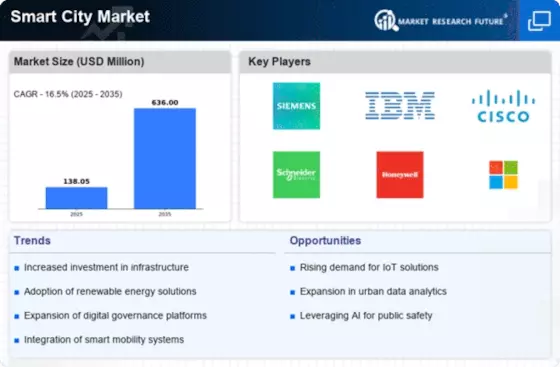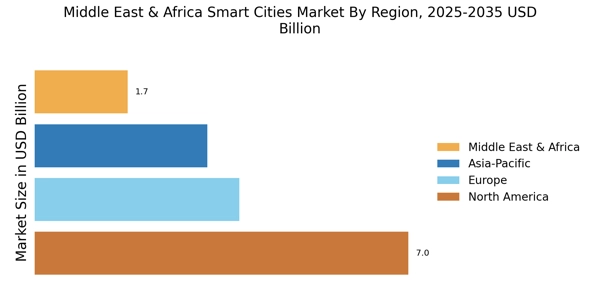Technological Advancements
Rapid technological advancements are a key driver in the MEA Smart City Market. The integration of Internet of Things (IoT) devices, artificial intelligence, and big data analytics is transforming urban environments. For example, cities like Dubai are implementing smart traffic management systems that utilize real-time data to optimize traffic flow, thereby reducing congestion. The proliferation of 5G technology is also expected to enhance connectivity, enabling more efficient communication between devices and infrastructure. This technological evolution not only improves the quality of urban life but also attracts investments from global tech companies, further propelling the MEA Smart City Market. The market is anticipated to grow at a compound annual growth rate (CAGR) of 20% over the next five years.
Public-Private Partnerships
Public-private partnerships (PPPs) are emerging as a vital driver in the MEA Smart City Market. These collaborations between government entities and private companies facilitate the sharing of resources, expertise, and risks associated with smart city projects. Countries like Qatar and Saudi Arabia are increasingly leveraging PPPs to fund large-scale infrastructure developments. For instance, the Lusail City project in Qatar exemplifies a successful PPP model, combining public oversight with private investment to create a smart urban environment. This approach not only accelerates project timelines but also enhances innovation through the involvement of private sector expertise. As the MEA Smart City Market continues to evolve, the role of PPPs is expected to grow, potentially accounting for a significant portion of the market's overall investment landscape.
Urbanization and Population Growth
Urbanization and population growth are driving forces behind the MEA Smart City Market. The region is witnessing a significant influx of people into urban areas, with projections indicating that by 2030, over 70% of the population in the MEA region will reside in cities. This rapid urbanization creates challenges such as increased demand for housing, transportation, and public services. In response, governments are investing in smart city solutions to enhance urban living conditions. For instance, Egypt's New Administrative Capital project aims to accommodate millions of residents with modern infrastructure and smart technologies. As cities evolve to meet the needs of growing populations, the MEA Smart City Market is expected to expand, with investments in smart solutions projected to exceed USD 30 billion by 2026.
Government Initiatives and Policies
The MEA Smart City Market is significantly influenced by proactive government initiatives aimed at urban development. Various countries in the Middle East and Africa have launched national strategies to promote smart city projects. For instance, the UAE's Vision 2021 emphasizes innovation and sustainability, which has led to substantial investments in smart infrastructure. In Saudi Arabia, the NEOM project represents a bold vision for a technologically advanced city, potentially attracting billions in investments. These government-led initiatives not only provide funding but also create a regulatory framework that encourages private sector participation. As a result, the MEA Smart City Market is likely to experience accelerated growth, with an estimated market size projected to reach USD 50 billion by 2025.
Sustainability and Environmental Concerns
Sustainability and environmental concerns are increasingly shaping the MEA Smart City Market. As climate change poses significant risks, cities are adopting smart technologies to promote sustainable practices. Initiatives such as renewable energy integration, waste management systems, and water conservation technologies are becoming prevalent. For example, Masdar City in Abu Dhabi is a pioneering project focused on sustainability, utilizing solar energy and smart grid technologies. These efforts not only address environmental challenges but also enhance the quality of life for residents. The growing emphasis on sustainability is likely to drive investments in the MEA Smart City Market, with estimates suggesting that green technologies could account for over 40% of total smart city investments by 2026.
















